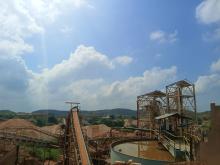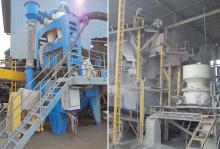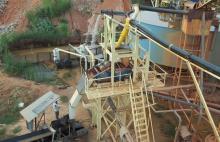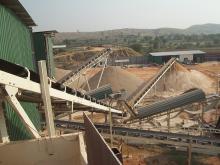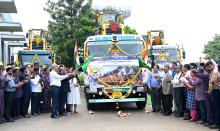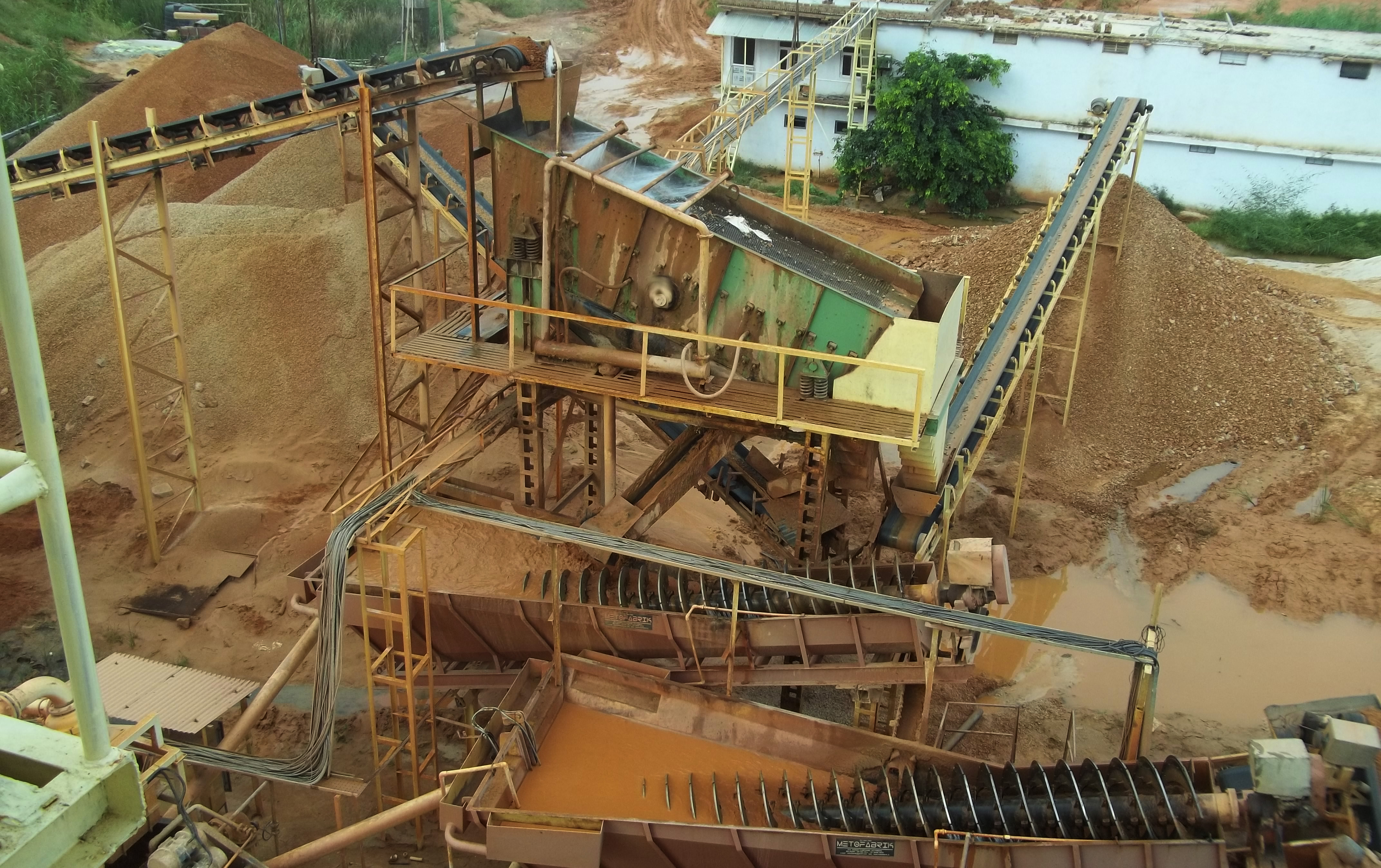
LSC Infratech, an Indian crushing plant giant, has invested heavily in newer mineral processing technologies. The investment has extended the firm’s product throughput, allowing it to better compete in the highly competitive Indian aggregates market. Partha Pratim Basistha recently visited LSC Infratech’s most recently upgraded mineral processing facility in Rajasthan, North India
LSC Infratech’s Bharatpur crushing facility in Rajasthan features some of the most technologically advanced plant in India. The site, situated in a regional 10,000tonnes/day crushing cluster, produces 3,000tonnes of aggregates/day, with final grade products ranging from 0-5mm, 10-20mm, and +0-4mm dust.
With five other crushing facilities already operating successfully in North India, LSC Infratech (LSC) started operations at Bharatpur in 2013 after acquiring 12 hectares of land on lease from the Rajasthan state government and gaining permission to produce aggregates from India’s directorate general of mine safety. LSC chose to set up the Rajasthan facility to cater for growing regional aggregates demand, led by a surge in infrastructure projects, mainly road and real estate construction from neighbouring North Indian states, including Haryana and Uttar Pradesh.
“We were the first in the area to commence mechanised crushing through two stage plants, setting the trend for other operators. Crushed output prior to that from here was between 4,000-5,000 tonnes per day. This was owing to employment of rudimentary levels of technology,” said LSC Bharatpur facility’s plant manager, Dinesh Chand Joshi.
In 2014 LSC decided to introduce at the Bharatpur site a roller crusher from New Delhi-based Laxmi Engineering. This meant the site could produce highly prized manufactured sand alongside its regular aggregates output.
Saurabh Agarwal, director of LSC, said: “We found high traces of silica in the rocks [at the crushing facility’s quarry]. Prior to this and due to not knowing about its presence, the silica wasted away from the rocks during the course of processing. Immediately after discovering traces of silica, we sent the boulder samples to the Indian Bureau of Mines in Ajmer, Rajasthan, for analysis. It was found that 98% of the rock samples contained fine silica. We then immediately decided to monetise the silica resource through setting up an advanced silica sand beneficiation plant. Commercial viability of the plant was ensured due to the proximity of Bharatpur to the foundries and glass industries located in parts of Uttar Pradesh, Rajasthan, Haryana and Uttarakhand.”
Having brought large dividends to the operation, the 500 tonnes/day silica sand plant is the star attraction of LSC’s Bharatpur mineral processing facility. It produces various silica sand products up to 600microns. LSC Bharatpur’s sand producing technology has been acquired from Weir Minerals, Bangalore, a subsidiary of
Shiv Kumar Agarwal, chairman and managing director, LSC Group, said: “We decided to select Weir Minerals as the preferred supplier of the equipment, as we were convinced on their higher reliability and productivity attributes and superior levels of service compared to other solutions providers. We were more convinced following reference shown by the company in Australia where similar beneficiation was done with a Weir system.”
Saurabh Agarwal added: “We are an environmentally cautious organisation, hence 100% water used in our production process is recycled using a state-of-the-art thickener supplied by McNally Sayaji of Bangalore. Hence, our total operation comes with zero discharge.”
He continued: “Our industrial silica sand is produced through a triple washing process. This makes it clean, uniformly sized, high quality silica sand that is bonded to form moulds for ferrous (iron and steel) and non-ferrous (copper, aluminous, brass) metal castings.
“One of our prime customers is Asahi India Glass. We are supplying the company 6,000 tonnes of industrial silica sand per month. We also supply close to 60 tonnes of dry silica sand to ladies’ glass bangle producing units in Uttar Pradesh.”
Dinesh Chand Joshi said: “Many of our present customers previously used to source the silica foundry sand locally in their respective states. However, supply was inconsistent. They were also subjected to price fluctuations. Now, with the right technology and an integrated production system backed by our crushing operation, along with quality dispatch systems, customers are now able to get consistent supply of quality sand at contracted volumes.”
Joshi added that prior to loading the silica sand, the bodies of order dispatch trucks are washed thoroughly through pressurised cleaning. This helps maintain final product quality. LSC sells its silica sand directly to customers but has appointed traders to help market this side of its business.
For aggregates production at the Bharatpur crushing facility’s quarry, LSC has outsourced boulder extraction and breaking to an expert agency owned and operated by industry veteran, Sarolia. The process of boulder extraction involves drilling six metres into the quarry rock face with one 2014-acquired
Of the Tata Hitachi excavator’s role in the production process, Sarolia said:
“Fuel consumption at 16 litres per hour makes operation quite economical. With its low level of automation and ready availability of parts, the machine is easy to own and operate.”
After being transported on a tractor trailer or by RDT to the crushing site, sub-500mm boulders are processed through a 300tonnes/hour WJ 1175
The operation of the Bharatpur crushing and sand manufacturing plant is supported by a further range of mobile equipment. Two
Saurabh Agarwal said: “We have our centralised office at Rudrapur in Uttarakhand, with plant operating across nine locations. Volvo’s Matris IT solutions in our excavators enables us to access real-time data on various operational parameters like fuel consumption, idling hours and switch-off time. It allows us to keep operating costs in check and optimise our excavators’ usage onsite.”
The Bharatpur plant also benefits from the deployment of a CLG856, 5tonne
Four Tata 6x4 rigid dump trucks with bodies from Hyva India are used at Bharatpur to transport raw materials from the quarry to the crushing plant. “We have undertaken modification in the truck bodies by thickening the inner plates from the existing 4mm to 6mm. This is to prevent holes caused by heavy boulder weight occurring in the bodies. Plate thickening also allows us to haul more loads,” said Omkar Singh.
The fully optimised plant operation at the Bharatpur facility is enabling LSC to improve its profitability. The site’s production capacity is due to be increased to 5,000tonnes/day at some stage within the next six months. This will be achieved through adding another 100tonnes/hour TC 1000 cone crusher from Terex. LSC will also increase its silica sand production by upgrading its classifiers and pumps.

